





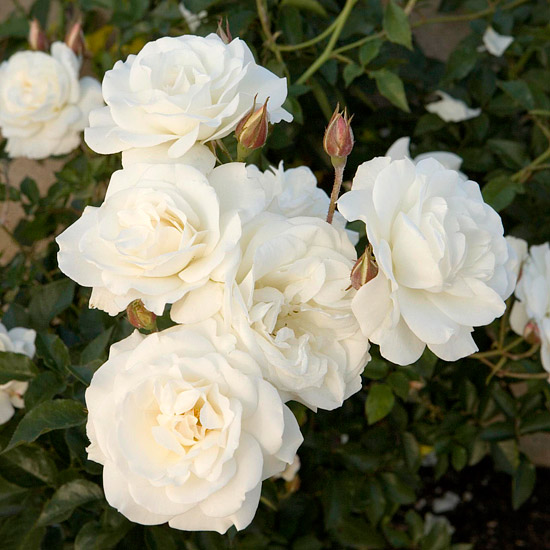
The two most important things that get your roses off to a great start are to make sure they're in the right growing conditions and to plant them properly.
All roses grow best in full sun with moist, well-drained soil that's rich in organic matter. Make sure your roses get at least six hours of direct sun a day; if they get less light, the plants won't bloom as well and will be more susceptible to attack from pests and diseases.
While some roses may tolerate shade a bit better than others, no roses prefer shady spots.
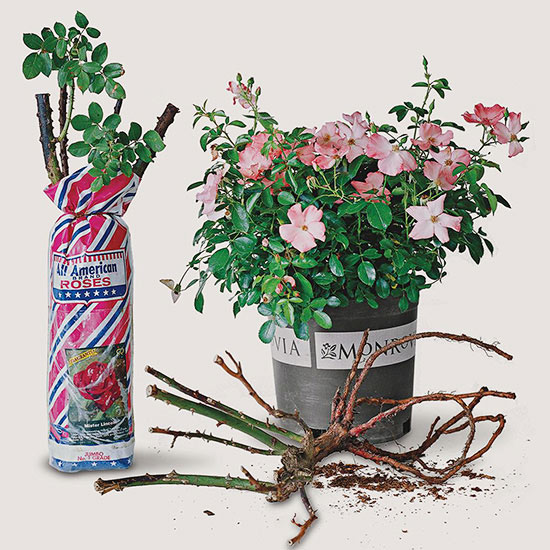
Bare-root roses are available in early spring and are sold simply as a set of roots packed in peat moss or a similar material that holds moisture well. It's best to purchase bare-root roses when they're dormant or just beginning to grow.
Container-grown roses are typically a little more expensive than bare-root roses, but are easier to plant. Simply dig a hole about twice as wide (but no deeper) than the rose's pot. Take the rose out of the container and loosen the roots. Spread them out if they're growing in circles around the root ball. Place the roots in the hole and fill with the soil, making sure to water well after you plant it.
Learn more about planting bare-root roses.
Learn more about planting container-grown roses.
Make sure you water your roses well after you plant them -- especially if you plant them in summer as they're most susceptible to drying out the first few weeks in your garden. Lay a 2- to 3-inch-deep layer of mulch over the soil around your roses. This helps the soil hold moisture and prevents weeds from growing. It can also act as a barrier to prevent soilborne diseases from splashing up on the leaves as easily.
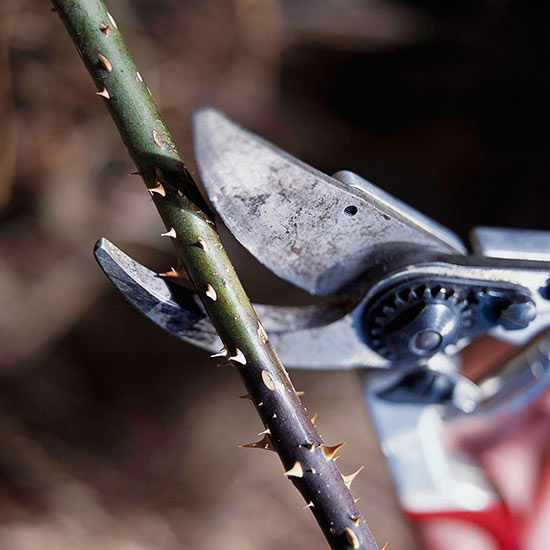
Prune and deadhead your roses to keep them lush, healthy, and full of blooms.
Most gardeners prune their roses in early spring, just before or as the plants begin to grow. This is often when the forsythia starts to bloom in your area. (The main exception is roses that bloom once a year early in the season; prune these varieties back right after they finish blooming.)
As you prune roses, keep in mind you want your plants to grow with an open center so air can flow freely through the plant -- and to keep your rose from looking like a crazy mess of branches. As you do this, cut out any dead branches, as well as small, weak canes.
You typically do heavy pruning early in the season, but deadhead throughout. To deadhead means to cut off faded blooms -- this makes your roses look better, helps prevent disease issues, and can encourage more blooms. Cut faded rose flowers back to the nearest leaf.
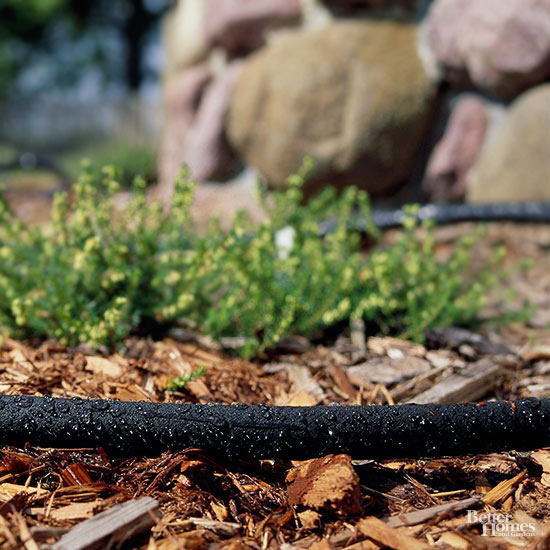
Most roses aren't super drought-tolerant, so give them a steady supply of moisture to keep them healthy and blooming. A general rule is roses prefer about an inch of water a week. But that sounds a bit deceptive because it's important to water them deeply. This encourages their roots to extend farther down in the soil where it stays moist longer.
Keep your roses healthy by using a soaker hose. This device slowly seeps water into the ground, directly to the roses' roots. It keeps the leaves dry, which helps your roses resist disease (because many diseases love wet leaves).
Learn more about watering roses.
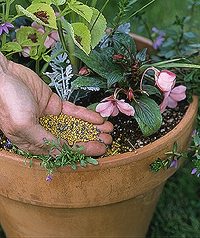
If your garden is blessed with rich soil or you amend it with compost or other forms of organic matter regularly, you probably won't need to feed your plants. But if you're cursed with poor soil or grow roses in containers, fertilizing can be helpful.
In most cases, all you need is a general-purpose garden fertilizer. Be sure to follow the directions on the packaging.
You might be tempted to use more fertilizer than is recommended, but you can have too much of a good thing. Overfertilization may cause your roses to produce fewer flowers, suffer root injury, or even kill the plants.
Because roses in containers can't reach farther into the soil to find more nutrients, they depend on you to feed them. One easy solution is to use a slow-release plant food. You just need to apply it once or twice a season and it feeds your plants for months.
Learn more about fertilizing!
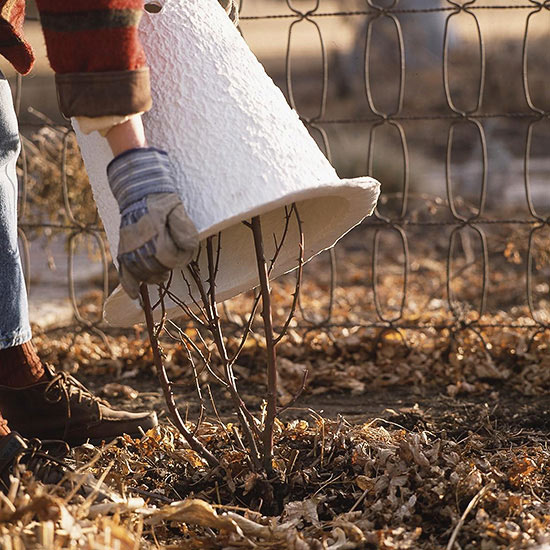
If you live in a Northern region, you will probably need to protect your roses during winter. No matter which method you use, wait until the soil has frozen: You want to keep the plants frozen all winter, not protect them from the cold. Here are common methods:
Mulch. Cover rose canes with several inches of loose mulch, such as weed-free straw, pine needles, or wood chips.
Rose cones. Protect roses with cones -- foam devices that look like white traffic cones. Mound soil over the rose crown, then cover the entire plant with the cone. Cut a few ventilation holes in the cone, and anchor it so it won't blow away during winter windstorms.
Containers. Grow roses in large containers and move them to a more sheltered spot, such as an unheated garage, storage shed, or cool basement over winter.
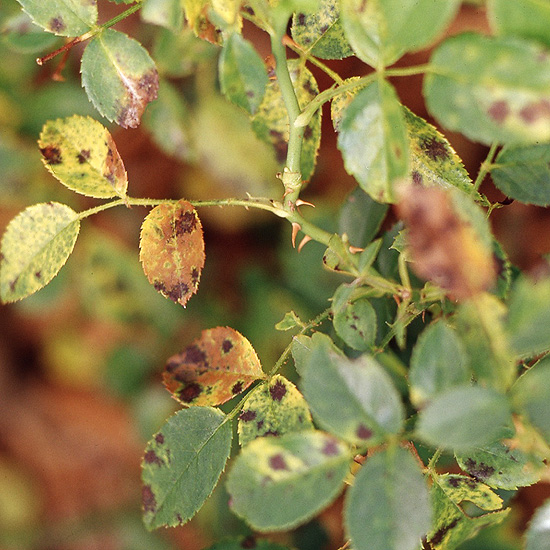
Even with good conditions, roses need a little maintenance. Here are treatments for common diseases:
Black spot. This disease looks like it sounds -- unsightly spots on the foliage. Prevent this disease with a garden fungicide labeled for use on roses during periods of cool, wet weather. Don't plant your roses too closely together and make sure they're in full sun. Avoid watering with a sprinkler -- wet foliage encourages disease.
Learn more about stopping black spot.
Powdery mildew. If you see a gray or white, fuzzy-looking film on your rose leaves, it's probably powdery mildew. Prevent it by using a garden fungicide labeled for use on roses during periods of wet or especially humid weather. Encourage good air flow and make sure your roses get plenty of sun.
Japanese beetles. These big bugs can practically eat all the foliage and flowers from a rose plant in just a couple of days. Pick light infestations by hand and drop the beetles into soapy water. Spray severe infestations with a garden insecticide containing carbaryl, permethrin, or neem.
Learn more about stopping Japanese beetles.
Aphids. If you see masses of tiny insects on your roses, it's likely aphids. If infestations are light, spray them off plants with a strong stream of water from a garden hose. For larger infestations, use a garden insecticide containing carbaryl, permethrin, or neem.
Learn more about stopping aphids.
Test Garden Tip: Select roses suited to your region; they'll be the best at standing up to disease. Also look for varieties labeled as disease-resistant -- but keep in mind that disease-resistant doesn't mean disease-proof.
The American Rose Society (ars.org) is a fantastic resource for more information about growing roses.
Copyright © www.100flowers.win Botanic Garden All Rights Reserved